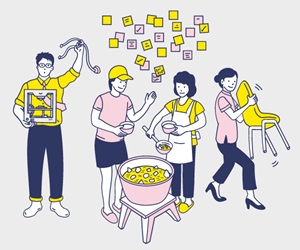Marieta's Little Miracles
She is a guardian of things too small for the naked eye, a babysitter of cancer-fighting cells. Meet Dr Marieta Chan, who calls herself the “mother” of three laboratories at the Blood Services Group, Health Sciences Authority.

As the microscope clicks into place, a mass of tiny dots appears in focus. These nondescript blobs are, in fact, formidable immune cells that may hold the cure to cancer one day.
Minute yet mighty, these cells are powerful. Studies have shown their potential to kill cancer cells so scientists are now harvesting them from both healthy donors and cancer patients, growing them to a substantial quantity, and then re-introducing them back to the patient’s body to fight cancer.
The ongoing trials depend very much on a team of unsung heroes at the Health Sciences Authority (HSA). Led by Lab Director Marieta Chan, this coterie of lab experts helps to breed the cancer-killing army at HSA’s Cell Therapy Facility.
Each batch of cells requires 28 days of utmost care; one wrong move and they could perish. “We have to feed the immune cells every two to three days,” says Dr Chan, 36, of her “babies”.
Every morning, lab officers like Ms Madelaine Niam enter the lab to feed the cells. They inject shots of potent nutrients specially concocted by scientists to spur growth.
Minute yet mighty, these cells are powerful. Studies have shown their potential to kill cancer cells so scientists are now harvesting them from both healthy donors and cancer patients, growing them to a substantial quantity, and then re-introducing them back to the patient’s body to fight cancer.
The ongoing trials depend very much on a team of unsung heroes at the Health Sciences Authority (HSA). Led by Lab Director Marieta Chan, this coterie of lab experts helps to breed the cancer-killing army at HSA’s Cell Therapy Facility.
Each batch of cells requires 28 days of utmost care; one wrong move and they could perish. “We have to feed the immune cells every two to three days,” says Dr Chan, 36, of her “babies”.
Every morning, lab officers like Ms Madelaine Niam enter the lab to feed the cells. They inject shots of potent nutrients specially concocted by scientists to spur growth.

We even have to wash away their pee and poop. I'm not kidding.
An apparatus, much like a washing machine, spins each bag at high speed and the centrifugal force generated separates waste matter from live cells.
Through sophisticated instruments, the lab officers check on the cells: Are the right type of cells alive and growing well? Are there enough of them?
It may seem like monotonous work but its impact on real lives cannot be underestimated. Every time the officers make a “delivery” – sending immune cells back to a patient – they are reminded that each bag they breed is a fighting chance at survival.
Ms Niam recalls the first patient they served in 2006. For two years, the lab harvested and bred nine batches of cells for the leukaemia patient, who eventually lost the battle to cancer. The lab officers even kept close tabs on his health via his girlfriend’s blog.
With the same care, the Cell Therapy Facility also babysits and grows stem cells, for up to six weeks each time. The stem cells will be used in another trial to regenerate damaged heart tissues in patients who had heart attacks.
Through sophisticated instruments, the lab officers check on the cells: Are the right type of cells alive and growing well? Are there enough of them?
It may seem like monotonous work but its impact on real lives cannot be underestimated. Every time the officers make a “delivery” – sending immune cells back to a patient – they are reminded that each bag they breed is a fighting chance at survival.
Ms Niam recalls the first patient they served in 2006. For two years, the lab harvested and bred nine batches of cells for the leukaemia patient, who eventually lost the battle to cancer. The lab officers even kept close tabs on his health via his girlfriend’s blog.
With the same care, the Cell Therapy Facility also babysits and grows stem cells, for up to six weeks each time. The stem cells will be used in another trial to regenerate damaged heart tissues in patients who had heart attacks.

Stem cells have the power to develop into other cell types, so we literally ‘feed’ them with the nutrients they require, to grow them up healthy and nurture them to become the cell type we need.
Dr Chan, who has three children, is also “mother” of the Immunohaematology and the Tissue Typing Labs.
The Immunohaemotology Lab performs tests on blood samples from donors and patients to ensure compatibility before a transfusion – an exercise not as simple as matching type A donor to type A recipient.
Instead, characteristics (like antigens and antibodies) in both donor’s and recipient’s blood have to be matched – even if they are both type A. The work, Dr Chan describes, is like “matching jigsaw puzzles”.
Over at the Tissue Typing Lab, officers hunt down matching white blood cells instead.
For instance, a leukaemia patient requiring a blood stem cell transplant will need an exact match of his Human Leucocyte Antigen (HLA) and the donor’s HLA.
The Immunohaemotology Lab performs tests on blood samples from donors and patients to ensure compatibility before a transfusion – an exercise not as simple as matching type A donor to type A recipient.
Instead, characteristics (like antigens and antibodies) in both donor’s and recipient’s blood have to be matched – even if they are both type A. The work, Dr Chan describes, is like “matching jigsaw puzzles”.
Over at the Tissue Typing Lab, officers hunt down matching white blood cells instead.
For instance, a leukaemia patient requiring a blood stem cell transplant will need an exact match of his Human Leucocyte Antigen (HLA) and the donor’s HLA.

The HLA (think of it as an eight-piece jigsaw puzzle) will ideally require perfectly matching pieces before a transplant can proceed. Lab officers perform tests to identify the eight pieces from the patient and all potential donors.
“It’s especially saddening to see young patients needing transplants,” says Dr Chan. “So the least we can do is to make sure our tests are fast and accurate for them, with the hope that these patients will grow up to be healthy.”
The same lab runs tests to ensure compatibility for organ transplants, too. Incompatible organs can “die” in their new homes, leading to complications, even fatality.
Dr Chan says her team is keenly aware that their work can be a matter of life and death, so the pressure is immense.
“It’s especially saddening to see young patients needing transplants,” says Dr Chan. “So the least we can do is to make sure our tests are fast and accurate for them, with the hope that these patients will grow up to be healthy.”
The same lab runs tests to ensure compatibility for organ transplants, too. Incompatible organs can “die” in their new homes, leading to complications, even fatality.
Dr Chan says her team is keenly aware that their work can be a matter of life and death, so the pressure is immense.

Whether or not a doctor decides to carry out a transplant depends on our tests. So we really have no room for mistakes.
Staff of both the Immunohaematology and Tissue Typing Labs are on duty 24/7 because “patients require transfusions everyday and some transplantations must be performed as soon as possible. So you can’t tell patients, sorry we are closed”.
“You have to see this job as service to the nation otherwise you won’t stay on,” says Dr Chan, admitting to the rigours and challenges of the work.
And what spurs this “mother” and her brood is simple: “It’s heartwarming to meet the organ transplant recipients… [They] remind me that the tests that our labs performed contributed to giving them this second chance.”
And this is why nine years after joining HSA as a fresh doctorate graduate, Dr Chan remains committed and excited about the possibilities of her work.
“You have to see this job as service to the nation otherwise you won’t stay on,” says Dr Chan, admitting to the rigours and challenges of the work.
And what spurs this “mother” and her brood is simple: “It’s heartwarming to meet the organ transplant recipients… [They] remind me that the tests that our labs performed contributed to giving them this second chance.”
And this is why nine years after joining HSA as a fresh doctorate graduate, Dr Chan remains committed and excited about the possibilities of her work.

She Loves Cells
Cells, says Dr Chan, are treated with much love, and are as precious as “babies are to mothers”. Red blood cells, she says, love it cold at about four degrees Celsius, while platelets like to be “rocked” at room temperature (about 22 degrees C), and plasma needs to be frozen at about 20 degrees C.- POSTED ON
Sep 8, 2010
- TEXT BY
Bridgette See









